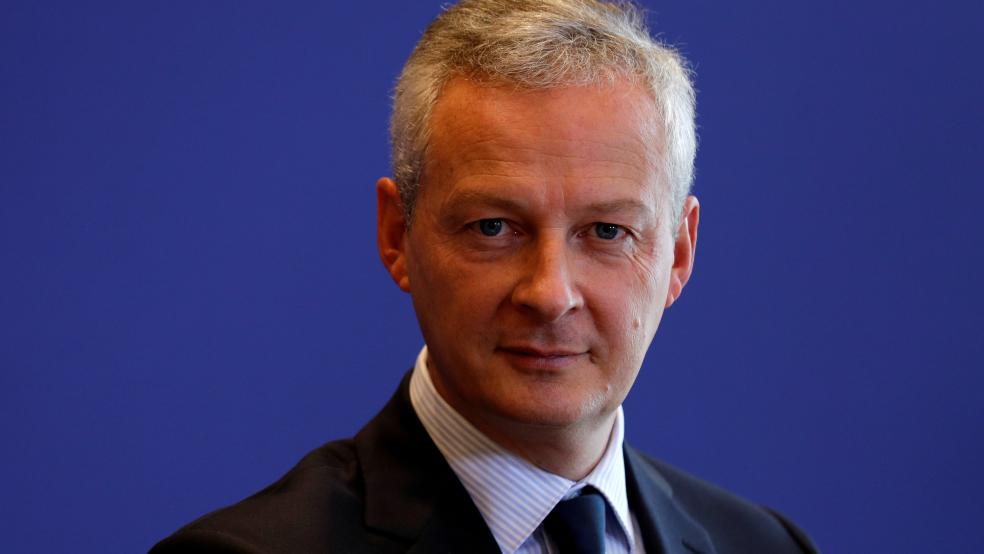BERLIN/PARIS (Reuters) - French Finance Minister Bruno Le Maire will meet German officials in Berlin this week to discuss the future of the euro zone and assess his own prospects of becoming the next chairman of the Eurogroup forum of finance ministers.
French and German officials confirmed Le Maire would be in Berlin on Wednesday, when he will meet acting Finance Minister Peter Altmaier, a close ally of German Chancellor Angela Merkel.Le Maire is also due to see Christian Lindner, leader of the liberal Free Democrats (FDP), and Cem Oezdemir, co-leader of the Greens party. Both are in discussions with Merkel's conservatives on forming a coalition government.France's Emmanuel Macron has made euro zone reform a central goal of his five-year presidency. But any changes will require the support of Merkel and her new government, which is not expected to be in place before Christmas. Lindner has been critical of Macron's idea to create a budget for the euro zone. "We want to follow up on the president's Sorbonne speech and exchange views on the future of the euro zone," a French finance ministry official said, referring to a speech by Macron in September when he laid out his vision for EU reform.While Le Maire's visit - his first to Berlin since the German election - is about strengthening contacts with likely members of the new government, officials indicated that it would also be an opportunity to sound out Berlin on the Eurogroup presidency, a powerful position that will be elected next month.Since it was created in 2005, the Eurogroup, which brings together the euro zone's 19 finance ministers, has had only two presidents: Luxembourg's Jean-Claude Juncker, who served from 2005 to 2013, and former Dutch finance minister Jeroen Dijsselbloem, who is due to step down in January.The position involves chairing monthly meetings and driving policy around economic and monetary union, including ensuring that all member states stick to strict targets on deficits and debt. The post has been dubbed "Mr Euro"."NO NATURAL CANDIDATE"Le Maire, 48, is regarded as sharp, ambitious and more than capable of leading the group. But some euro zone officials are wary about the presidency ending up in the hands of either Germany or France, the two largest economies in the single currency bloc and already dominant forces in policymaking.A further complication for Le Maire is France's poor record of meeting its own deficit targets over the past decade. German officials are not ruling out Le Maire, but they have also expressed a preference for giving the post to a smaller country.Last week, one official in Berlin mentioned two possible alternatives: Pierre Gramegna of Luxembourg and Peter Kazimir of Slovakia. The official also floated the idea of extending Dijsselbloem, seen as a close ally of Berlin, even though he is not part of the new Dutch government."It is still quite unclear who will come forward," the German official said when asked about the presidency. "At this stage there does not seem to be one candidate everyone is rallying behind. There is no natural candidate."The Eurogroup president will be chosen on Dec. 4, an EU official said last week, with the formal call for candidates opening in mid-November."It is not a done thing," the German official said of Le Maire's candidacy. "He will only apply if he gets the impression that he is the one." The talks in Berlin on Wednesday could be decisive in determining whether he does throw his hat into the ring.If Le Maire were to get the job, it could have repercussions for other top euro zone jobs. Mario Draghi will end his term as president of the European Central Bank on Oct. 31, 2019, and Germany's Jens Weidmann is already being mentioned as a potential successor.Euro zone watchers say that if the French secure the presidency of the Eurogroup, it may be harder for them to argue against a German candidate taking over the ECB.Still, as one senior French official told Reuters on condition of anonymity last month, Weidmann at the helm of the ECB "would be a problem for a lot of countries, not just for France". (Writing by Luke Baker, editing by David Evans)France's Le Maire heads to Berlin to test Eurogroup waters

PHILIPPE WOJAZER



